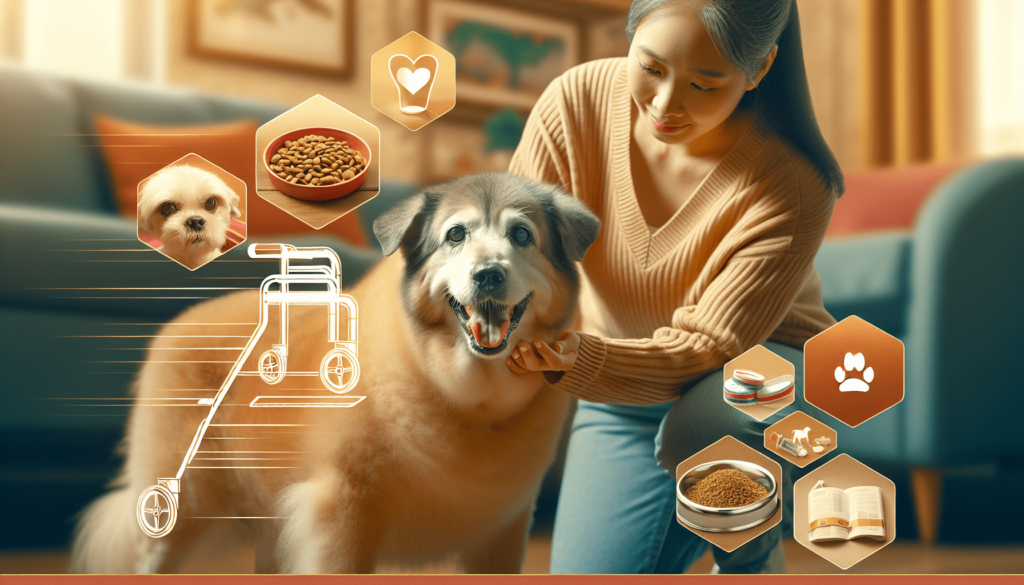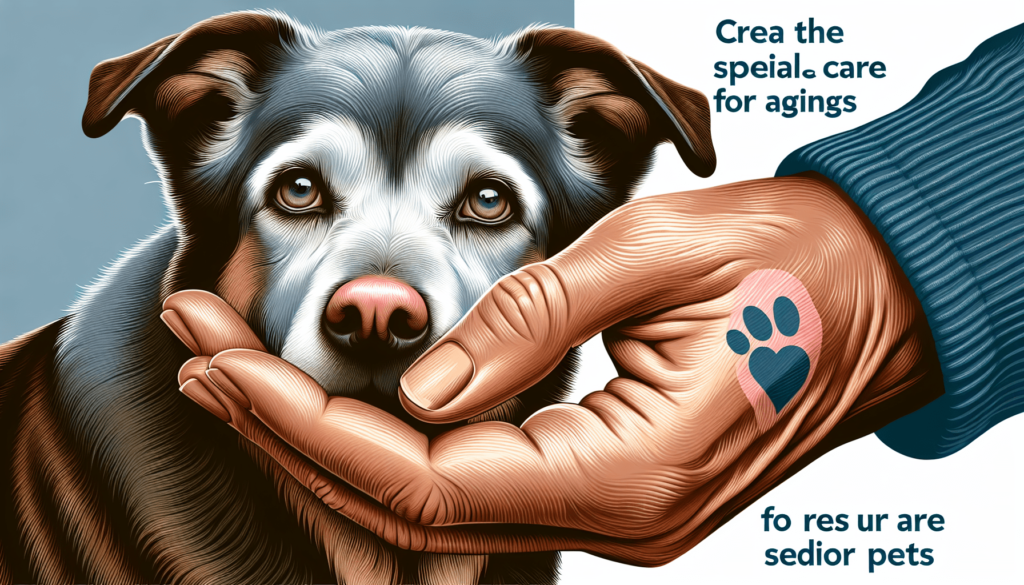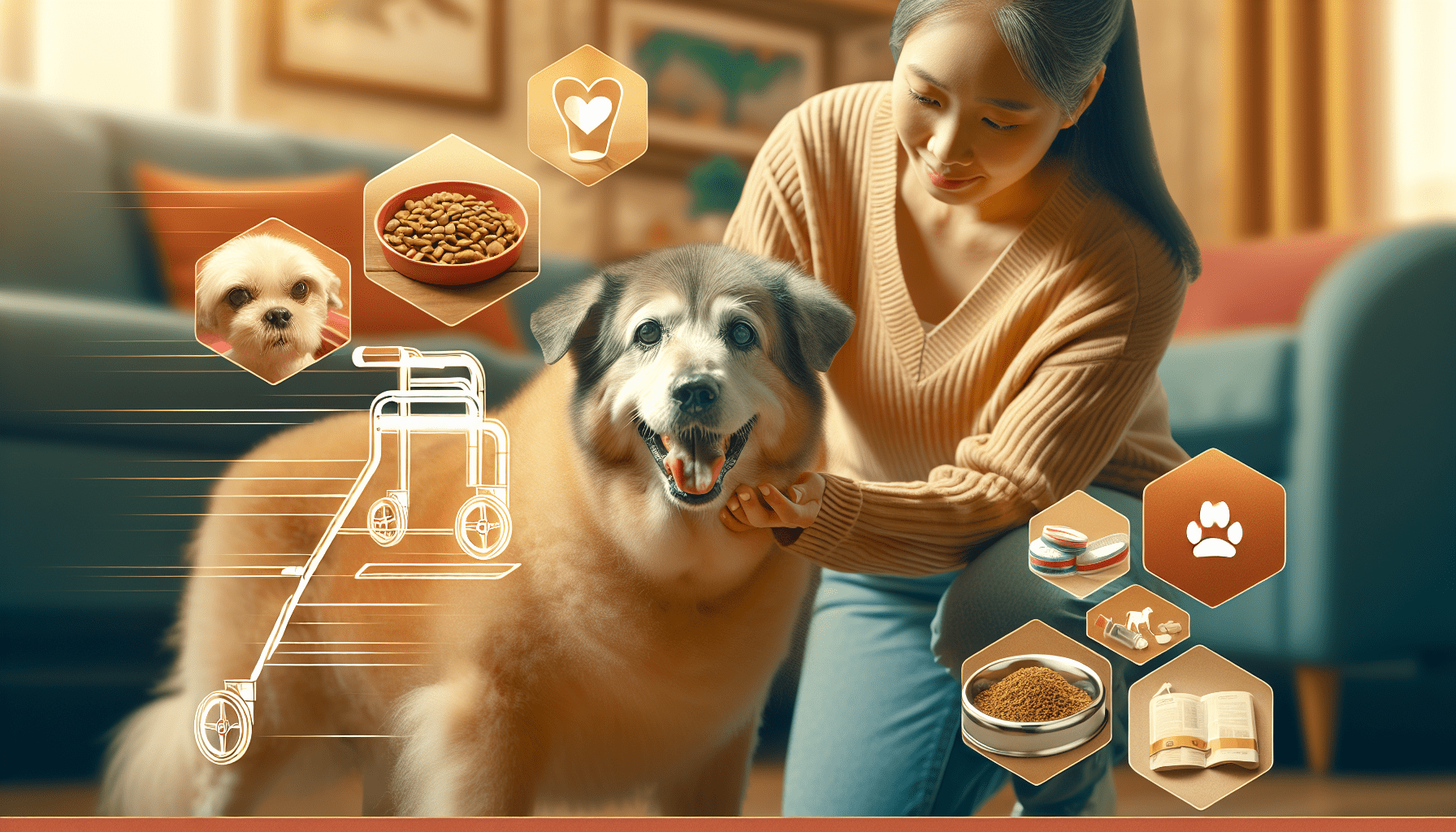As your furry companion grows older, they require extra care and attention to ensure their overall well-being. In this article, we will explore the unique needs of senior pets and how to best support them in their golden years. Whether it’s adjusting their diet, providing proper exercise, or addressing potential health concerns, understanding and catering to the specific requirements of your aging pet is crucial for their happiness and longevity. So, let’s delve into the world of senior pets and discover how we can ensure their quality of life remains as vibrant as ever.

Physical Limitations
Decreased Mobility
As your pet ages, you may notice a decrease in their physical mobility. They may struggle to get up from laying down, have trouble climbing stairs, or experience stiffness and difficulty walking. It’s important to provide them with a supportive environment that takes their limited mobility into consideration. Consider providing soft and non-slip surfaces for them to walk on, such as rugs or carpet runners. You can also use pet ramps or stairs to assist them in reaching higher surfaces. Additionally, regular exercise tailored to their abilities can help maintain muscle strength and flexibility.
Arthritis and Joint Pain
Arthritis is a common condition in senior pets, causing inflammation and pain in their joints. If you notice your pet having difficulty with activities that were once easy for them, such as jumping or running, they may be experiencing joint pain. Consult with your veterinarian about medications or supplements that can help ease their discomfort. Providing a warm and comfortable environment, such as heated pet beds, can also help alleviate joint pain. Additionally, low-impact exercises can help strengthen muscles around the joints and provide some relief.
Loss of Sight or Hearing
As pets age, they may experience a decline in their vision or hearing abilities. If you notice your pet bumping into furniture or appearing disoriented, they may be losing their sight. Similarly, if they are no longer responsive to sounds or have difficulty locating the source of sounds, their hearing may be impaired. It is essential to make their living space safe and accessible by keeping furniture arrangements consistent and avoiding sudden changes. Use verbal cues or hand signals to communicate with them effectively. Be patient and provide ample support and reassurance to help them adjust to their changing sensory abilities.
Diet and Nutrition
Weight Management
Maintaining a healthy weight is crucial for your senior pet’s overall well-being. Older pets tend to have a slower metabolism, which means they have a higher risk of weight gain. Obesity can lead to various health issues, including joint problems and heart disease. Ensure you are feeding them a well-balanced diet designed for senior pets. Monitor their calorie intake and adjust their portion sizes accordingly. Consult with your veterinarian to determine their ideal weight and discuss any dietary changes or restrictions that may be necessary.
Digestive Issues
Senior pets may be prone to digestive issues such as constipation or diarrhea. These problems can be caused by a variety of factors, including dietary changes, medication side effects, or underlying health conditions. It’s essential to provide them with a diet that is easily digestible and contains sufficient fiber. If your pet is experiencing digestive problems, it’s crucial to consult with your veterinarian to determine the cause and appropriate treatment. They may recommend changes to their diet or prescribe medications to help regulate their digestive system.
Nutritional Supplements
In addition to a balanced diet, your senior pet may benefit from nutritional supplements to support their overall health. Glucosamine and chondroitin supplements can help promote joint health and alleviate arthritis symptoms. Omega-3 fatty acids can aid in maintaining healthy skin and coat. Probiotics can support a healthy digestive system. However, it’s crucial to consult with your veterinarian before introducing any supplements to ensure they are safe and appropriate for your pet.
Exercise and Activity
Low-Impact Exercise
Regular exercise is essential for senior pets to maintain their physical and mental well-being. However, it’s important to choose low-impact exercises that are suitable for their age and physical abilities. Activities such as gentle walks, swimming, or light play sessions can help keep their muscles strong without putting excessive strain on their joints. Make sure to monitor your pet during exercise and provide them with breaks and plenty of water. Consult with your veterinarian to create an exercise plan that suits your pet’s specific needs.
Mental Stimulation
Mental stimulation is just as important as physical exercise for senior pets. Engaging their minds with puzzles, interactive toys, or training sessions can help keep them mentally sharp and prevent cognitive decline. Consider introducing new toys or rotating their toys to keep their interest levels high. Teaching them new tricks or practicing obedience commands can provide mental stimulation while strengthening your bond with them.
Adapting to Individual Abilities
Every senior pet is unique and may have different limitations when it comes to exercise and activity. It’s important to adapt to their individual abilities and make modifications as needed. If your pet has mobility issues, you can incorporate short, frequent walks instead of long ones. Provide them with gentle stretching exercises or physical therapy exercises recommended by your veterinarian. Be attentive to any signs of fatigue or discomfort during activities and adjust accordingly. Remember that even small amounts of exercise and mental stimulation can have a significant impact on their overall well-being.
Veterinary Care
Regular Check-ups
Regular veterinary check-ups are crucial for senior pets to ensure early detection and prevention of any health issues. Your veterinarian will perform a thorough physical examination, including blood tests and diagnostic screenings, to assess your pet’s overall health. These check-ups allow for the identification of any potential problems and the development of an appropriate treatment plan. Keep a record of your pet’s health history and share any concerns or changes in behavior with your veterinarian during these visits.
Preventive Care
Preventive care, such as vaccinations and parasite control, remains important for senior pets. Older pets may have a weakened immune system, making them more susceptible to certain diseases. Ensuring they are up to date on vaccinations and receiving regular parasite prevention treatments can help protect their health. Your veterinarian may also recommend additional preventive measures, such as dental cleanings or regular blood screenings, to maintain their well-being.
Managing Chronic Conditions
Senior pets may develop chronic conditions, such as diabetes, kidney disease, or heart disease. It’s essential to work closely with your veterinarian to manage these conditions effectively. This may involve regular monitoring, medication administration, dietary changes, and lifestyle adjustments. By following your veterinarian’s recommendations and maintaining open communication, you can help ensure your senior pet’s quality of life is optimized despite any chronic conditions they may have.

Comfort and Environment
Orthopedic Bedding
Providing your senior pet with comfortable bedding is essential to support their aging bodies. Orthopedic beds are designed to alleviate joint pain and pressure points, providing extra support for their bones and muscles. These beds are made with memory foam or other supportive materials that conform to your pet’s body shape. Investing in a cozy and supportive bed can greatly improve your pet’s comfort and overall sleep quality.
Temperature Regulation
Older pets may have difficulty regulating their body temperature as effectively as they once did. It’s important to ensure their living space is kept at a comfortable temperature. Avoid exposing them to extreme heat or cold and provide appropriate shelter and bedding if they spend time outdoors. Monitor their behavior for signs of overheating or excessive cold, such as panting, shivering, or seeking warm or cool surfaces. Consult with your veterinarian if you have concerns about your pet’s ability to tolerate temperature changes.
Safe and Accessible Living Space
As mobility decreases, it is important to ensure your senior pet’s living space is safe and accessible. Remove any tripping hazards, such as loose rugs or clutter, from their environment. Consider placing ramps or pet stairs to assist them in reaching elevated surfaces. Install handrails or grab bars near stairs or areas where they may need additional support. Providing easy access to food, water, litter boxes, and resting areas can greatly enhance their quality of life and independence.
Grooming and Hygiene
Brushing and Bathing
Grooming plays a vital role in maintaining your senior pet’s hygiene and overall health. Brushing their coat regularly helps remove loose hair, prevents matting, and stimulates their skin. Choose grooming tools that are gentle on their aging skin, and be mindful of their comfort during grooming sessions. Bathing should be done as needed, using pet-friendly shampoos and warm water. Consult with your veterinarian for guidance on the appropriate grooming routine for your senior pet depending on their breed and overall health.
Oral Care
Senior pets are prone to dental issues such as gum disease and tooth decay. Good oral hygiene is essential to prevent these problems and maintain their overall health. Regularly brushing their teeth with a pet-specific toothbrush and toothpaste can help remove plaque and prevent the buildup of tartar. Provide them with appropriate dental treats or chew toys designed to promote dental health. Regular dental check-ups and professional cleanings may also be necessary to ensure their oral health is properly maintained.
Keeping Nails Trimmed
Overgrown nails can cause discomfort and affect your senior pet’s mobility. As they become less active, their nails may not naturally wear down as quickly. Regular nail trims are essential to prevent nails from becoming too long and causing issues such as ingrown nails or joint pain. If you are uncomfortable trimming your pet’s nails yourself, consider scheduling regular appointments with a professional groomer or veterinarian.
Emotional Support
Maintaining Routine
Senior pets thrive on routine and familiarity. Maintaining a consistent daily routine can help reduce any anxiety or confusion they may experience as they age. Aim to feed them, exercise them, and interact with them at the same times each day. Consistency in their environment and routine can provide a sense of comfort and security.
Reducing Anxiety
Just like humans, pets can experience anxiety, especially as they age. Changes in their environment, separation from their owners, or loud noises can trigger anxiety in senior pets. Provide them with a calm and quiet space where they can retreat to when they feel anxious. Consider using calming pheromone sprays or diffusers to create a soothing atmosphere. If your pet experiences significant anxiety, consult with your veterinarian for additional strategies or possible medication options.
Engaging in Bonding Activities
Engaging in bonding activities with your senior pet can provide them with emotional support and strengthen the bond between you. Spend quality time playing games, cuddling, or engaging in gentle physical touch, such as massages or grooming sessions. These activities can help alleviate stress, boost their mood, and enhance their overall well-being.
Social Interaction
Interaction with Other Pets
If you have other pets in your household, it’s important to support positive interactions between your senior pet and their furry companions. Encourage gentle play and supervise their interactions to prevent any accidents or excessive roughness. It’s crucial to ensure that your senior pet has ample space and time to relax and be alone if they desire. However, social engagement with other pets can provide mental stimulation and companionship, which is beneficial for their overall well-being.
Visits from Family and Friends
Regular visits from family members and friends can provide your senior pet with social interaction, mental stimulation, and a familiar connection. Make sure visitors are aware of any specific needs or limitations your pet may have. Encourage gentle and calm interactions to avoid overwhelming or stressing your senior pet. These visits can brighten their day and provide them with companionship and love.
Participation in Senior Pet Programs
Many communities offer senior pet programs or events specifically designed for older pets. These programs often provide socialization opportunities, educational resources, and fun activities for both pets and their owners. Participating in these programs can be a great way to keep your senior pet active, engaged, and connected with other pet owners going through similar experiences.
End-of-Life Care
Palliative Care
As your pet reaches the end of their life, palliative care focuses on keeping them comfortable and pain-free. Your veterinarian can work with you to develop a care plan that may include pain management, medication adjustments, and additional support. Palliative care aims to maximize your pet’s quality of life during their final stages.
Hospice Care
Hospice care for pets focuses on providing comfort and support in the final stages of life. The goal is to ensure your pet experiences a peaceful and pain-free transition. Hospice care may involve pain management, ensuring a calm and quiet environment, and providing emotional support for both your pet and yourself.
Making End-of-Life Decisions
When the time comes, making end-of-life decisions for your pet can be a challenging and emotional process. It’s important to have open and honest communication with your veterinarian about your pet’s quality of life. They can provide guidance on when it may be time to consider euthanasia or natural passing. Consider discussing your preferences and creating a plan in advance, so you are prepared when the time comes.
Resources and Support
Senior Pet Organizations
There are various organizations dedicated to supporting the unique needs of senior pets and their owners. These organizations provide resources, educational materials, and sometimes financial assistance for veterinary care. Research and reach out to these organizations for guidance and support specific to your senior pet’s needs.
Online Communities
Online communities and forums can provide a wealth of knowledge and support for owners of senior pets. Joining these communities allows you to connect with other pet owners who are experiencing similar challenges and can offer advice or share personal experiences. It’s important to remember that online communities should not replace veterinary advice, but they can be a valuable supplement to your overall knowledge and support system.
Veterinary Referrals
Your veterinarian can serve as a valuable resource for additional support and referrals. If you have specific concerns or need specialized care for your senior pet, your veterinarian can recommend specialists or organizations that focus on the specific needs of senior pets. They can provide guidance on where to seek additional support and care for your beloved companion.
As your pet enters their golden years, understanding their special needs and providing appropriate care is essential for their overall well-being and quality of life. By adapting their environment, diet, exercise routine, and providing emotional support, you can ensure that your senior pet continues to enjoy a happy and comfortable life. Remember that regular veterinary care and open communication with your veterinarian are key components of providing the best possible care for your aging furry friend.

